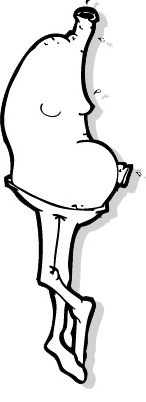Hopfen und Malz, Gott erhalts: a German beer indecision part 3.
Sunday, 25 May 2008 by kinakoJam

My next bier-tasting foray involved the organic filtered Kristall Weisse offering from Neumarkter Lammsbrau brewery. It's the brewery responsible for my thus-far-favourite beer, their Dunkel. But this filtered white beer - the style drunk at Munich's Oktoberfest - I am afraid to say, inspired nothing but ambivalence in me. In fact after half a glass I lost interest and tipped the rest down the sink. If I can't dig the most chugged beer in Germany, what kind of real potential can I have as a beer drinker?

Feeling overwhelmed by ambivalence, I decided not to rush into any more experimentation.
But getting back from the Biomarkt, the Dunkel was not chilled, and there was still that bottle of Köstritzer Schwarzbier in the fridge. I brought it home the other night from the underwhelming selection at a shop nearby which dares to call itself a 'beer museum'.
Apparently this East German schwarzbier is a type of lager, and not supposed to be heavy like a stout. The Köstritzer brewery in east Germany has been owned by the Bitburger Brauerei since 1991 and is located in Bad Köstritz, which is close to Gera in Thuringia. The brewery was founded in 1543 and it is one of the oldest producers of Schwarzbier (black beer) in Germany. This particular old black brew was a favourite of Germany's proud author Goethe, at least on the days when he felt a bit ill.
A classic style, it is cold fermented and cold lagered, and thus, as I have read, "the finished product is relatively clean and free of fruity esters". I get the feeling I am not so much the fan of fruity esters.
Pitch black like coffee, with a head of foam that within a few moments deflated to a floating piece of brownish-creamy scum like sea foam after a storm. It then dwindled further to dregs with a certain mucous-like viscosity in appearance.
Clean and bitter, refreshing, quite a light malty mouth-feel and a rumour in the mouth of a pot of drip coffee that's been on the burner for a while, or tobacco. Like the 'Old Spice' of beers. Not much substance but full of promises. There is a taste to this one that makes me want to be a newspaper man with a black umbrella, in a city where a million hollow souls trade jaded glances between skscraper canyons.
In other words, I got a bit drunk and became a little bit too effusive. And couldn't spell skyscraper properly.
In this bottle of Köstritzer Schwarzbier, there is also a very faint freshness of a bitter grass or a tiny, tiny bit of sweetness: something hopeful.
Maybe the hope I'm tasting, is the hope that I can really be friends with beer.
There are now at least four or five types of beer that I can say I really enjoy. The cool thing about this one is that it is available from a lot of cornershop kiosks.

Whether you like "fruity esters" is entirely a matter of taste. Ester compounds are made by the yeast during fermentation. Generally, high fermentation temperature, aeration of the "wort" (the beer before yeast is added) and different yeast strains cause them.
They tend to end up tasting like banana. They're mostly frowned upon because they're a hard flavour to control in beer, or if you're a beer wanker - they fall outside the particular style, rather than being bad.
If you're keen at looking at how beer "should" taste according to the judging guidelines, they're at http://www.bjcp.org/stylecenter.html
thanks Phil, very useful... maybe soon I can categorically say why I don't so much love Weissbier, Koelsch or Lion Red